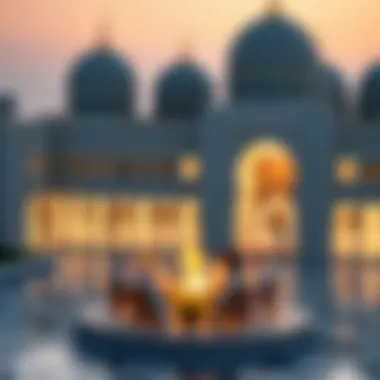UAE Calendar 2024: Key Holidays and Observances


Intro
The UAE, a vibrant hub of culture and commerce, is a mosaic of traditions and modernity. The year 2024 unfolds a rich tapestry of holidays and observances that are not just dates on a calendar but essential aspects of life in this unique nation. Understanding the implications of these dates is vital for residents and visitors alike, whether for personal planning or business considerations.
In this article, we will delve into the significant holidays and important cultural events that define the UAE calendar for 2024. Each celebration is steeped in history and local customs that reflect the values and traditions of the Emirati people.
Moreover, this comprehensive guide is tailored for investors, agents, developers, and homeowners, providing insights that facilitate planning around these key dates. Whether you're considering a trip, planning a business launch, or managing property, timing can significantly influence success.
From religious observances to national holidays, we will explore how these events can impact the social landscape and economic activities within the Emirates. By the end of this overview, you will have a clearer picture of how to navigate the calendar and leverage these observances for both personal and professional advantage.
Understanding the UAE Calendar
The UAE calendar is more than just a collection of dates; it serves as a crucial framework for the social, economic, and cultural activities within the United Arab Emirates. For investors, agents, developers, and homeowners, having a comprehensive grasp of the UAE calendar is paramount as it impacts various sectors, from real estate transactions to cultural celebrations.
The calendar's structure comprises both the Gregorian and Islamic systems, reflecting the amalgamation of tradition and modernity that characterizes the UAE. This dual-system allows individuals and businesses to synchronize activities across different communities. While many expatriates and residents rely on the Gregorian calendar for everyday planning, understanding significant Islamic dates is equally important. Islamic holidays, governed by lunar cycles, fluctuate annually, requiring constant adaptation in scheduling business events, school vacations, and community gatherings.
Structure of the UAE Calendar
The UAE calendar follows the traditional Gregorian system for administrative and practical purposes, commonly employed in business and educational contexts. This hybrid approach aids international companies and foreign investors in navigating their operations smoothly. Typically, January through December is marked with various holidays aligned with significant Islamic observances, festivals, and national events.
In parallel, the Islamic calendar features twelve lunar months, with each month lasting either 29 or 30 days, depending on the sighting of the moon. This variation introduces a level of flexibility that ensures the observance of Islamic dates such as Ramadan or Eid that revolve around the phases of the moon, making it important for residents to remain well-informed about changes each year.
For clarity and understanding, the major elements defining the UAE's calendar structure include:
- Public holidays based on the Islamic calendar
- Fixed dates for annual events following the Gregorian calendar
- Observances that vary annually, necessitating ongoing public announcements and updates from official sources like the UAE government
By understanding this unique arrangement, stakeholders can plan their strategies effectively while respecting cultural norms and traditions.
Significance of Islamic Calendar
The Islamic calendar holds deep-rooted significance in the UAE,as it aligns with the values and practices of the predominantly Muslim population. It serves not only as a guide for religious observances but shapes the very fabric of social interactions and cultural festivities in the UAE.
Key occasions such as Eid al-Fitr and Eid al-Adha illustrate how religious commitments impact community cohesion and economic activity. As these celebrations approach, businesses often modify schedules to accommodate prayer times, festive promotions, and family gatherings.
For context, here are some important elements regarding the Islamic calendar's significance in the UAE:
- Cultural Identity: It fortifies the national identity and shared values amongst residents. Understanding these dates is essential for anyone wishing to blend into the local culture.
- Seasonal Adjustments: The shifting dates of Islamic holidays necessitate periodic changes in business operations, leading many organizations to adapt their strategies for efficiency.
- Social Engagement: During Ramadan, the holy month of fasting, the Islamic calendar becomes even more central as community gatherings, charity drives, and religious activities take precedence. Homes bustle with family members returning from various locations to celebrate together.
As such, the Islamic calendar is not merely a timekeeping method; it infuses everyday life with traditions, obligations, and a collective consciousness that bridges generations within the UAE.
By appreciating both the structure and significance of the UAE calendar, stakeholders will be better equipped to navigate the landscape of opportunities and relationships that define life and commerce in this vibrant region.
Public Holidays in the UAE
Public holidays in the UAE play a pivotal role, serving both as opportunities for individuals to celebrate rich cultural traditions and as necessary pauses for businesses to evaluate their operations throughout the year. With a diverse population and various customs reflective of the country's multicultural fabric, these holidays stand as a testament to the UAE's deep-rooted heritage and its modernization efforts. Understanding the significance of public holidays helps expatriates and locals alike to integrate better and respect the traditions that shape their communal life.
Overview of National Holidays
National holidays are not merely days off; they encapsulate the spirit of the nation. In the UAE, these holidays are recognized at both federal and local levels, bringing people together from various backgrounds. Examples include New Year's Day, UAE National Day, and various public commemorations of important events.


During these holidays, the country transforms into a vibrant tableau of celebrations marked by festivities that often include fireworks, parades, and community gatherings. For investors, understanding the national holidays is essential in planning business activities. Festivals can affect operating hours and client availability. Knowing these can lead to better strategizing and efficient resource management.
Religious Observances
Religious observances in the UAE are deeply intertwined with its cultural identity. These occasions offer insight into the values and spiritual practices influential within the nation. Major Islamic holidays like Eid al-Fitr and Eid al-Adha are excellent moments to experience UAE's community bonding and festivity firsthand.
Islamic New Year
The Islamic New Year marks the beginning of the lunar calendar year for Muslims, a day for reflection and renewal. It is not only an opportunity for personal reflection but also sets a tone for the months that follow, fostering a period of growth.
A key characteristic of Islamic New Year is its unpredictable date, as it is determined by the sighting of the moon. This can lead to some surprises in planning. In the framework of this article, shedding light on its shifting dates and significance will assist readers in preparing for potential celebrations or communal activities.
- Unique Feature: The observance encourages personal growth and community spirit.
- Advantage: Provides a moment for reflection amid the fast-paced life many reside in.
Eid al-Fitr
Eid al-Fitr marks the end of Ramadan, a month of fasting, and is perhaps the most anticipated holiday in the Muslim calendar. The holiday embodies joy and gratitude, marking the end of a month of self-discipline and devotion. Families gather for prayers at mosques, elaborate feasts are shared, and donations to charity are made, signaling community responsibility.
Notably, the holiday emphasizes the importance of family and social ties, as it encourages visiting loved ones and exchanging gifts, strengthening relationships.
- Key Characteristic: The festive atmosphere that permeates through social gatherings.
- Advantage: Boosts local economies as businesses and markets thrive with increased customer activity.
Eid al-Adha
Eid al-Adha, often called the "Festival of Sacrifice," honors the willingness of Ibrahim (Abraham) to sacrifice his son as an act of obedience to God. This holiday is particularly significant as it reflects themes of sacrifice, generosity, and community, making it a cornerstone of Islamic culture.
During this period, families often partake in the ritual of Qurbani, the sacrifice of a livestock animal, symbolizing charity and community spirit. The communal sharing of meat from the sacrifice brings a sense of unity, strengthening the bond among family and friends.
- Key Characteristic: Emphasizes charity and communal dining.
- Advantage: Provides opportunities for outreach and understanding between cultures and religions.
National Day Celebrations
Every December 2nd, the UAE celebrates its National Day, commemorating the union of the seven emirates in 1971. This day is marked with parades, fireworks, and cultural exhibitions across the country. Unlike other holidays, it creates an atmosphere of national pride that ignites a sense of shared identity among residents. The diverse celebrations showcase the rich cultural heritage of each emirate, drawing attention to the unity that binds them together.
For investors and businesses, participating in National Day activities or offering cultural experiences aligns well with the community’s values, as it showcases an understanding and appreciation of the local culture.
Detailed Examination of Holidays in
Understanding the specific holidays within the UAE calendar for 2024 is crucial for various sectors, including business, education, and tourism. The holidays reflect deep-rooted cultural values and observances integral to the national identity. A clear grasp of these holidays helps investors, developers, and residents to plan their activities accordingly. Moreover, being aware of holiday timings can enhance community engagement, driving respect and familiarity with local customs. Each holiday has a unique character, stemming from historical, religious, or cultural significance.
New Year's Day
New Year's Day on January 1 marks the official start of the Gregorian calendar year, and is generally celebrated with both quiet reflection and celebratory gatherings across the UAE. It’s a public holiday, allowing residents a moment to unwind, while many establishments run special promotions and events to attract both locals and tourists. Families often use this day to spend time together, with many opting for outings to parks or dinners at popular restaurants. The ambiance is often filled with hopes and aspirations for the year ahead, setting a positive tone. This is a day steeped in potential and promise.
Eid al-Fitr Dates
Eid al-Fitr, marking the end of Ramadan, holds great spiritual significance. In 2024, the holiday is expected to begin on April 10, but since Islamic holidays are based on the lunar cycle, the exact date may vary. This day is celebrated with communal prayers, feasting, and giving thanks, underscoring the values of gratitude and community. Families typically gather to share meals and gifts, and many give Zakat al-Fitr, a charity donation meant to assist those in need during festivities. The communal aspect of Eid fosters unity within the diverse Emirati society.
Eid al-Adha Dates


Following Eid al-Fitr, Eid al-Adha falls on June 16 in 2024. This important Islamic holiday commemorates the willingness of Ibrahim (Abraham) to sacrifice his son as an act of obedience to God. Celebrations often include the sacrifice of an animal, based on Islamic tradition, with a focus on family gatherings and acts of charity. People gather for prayers, and many take part in the communal feast, where meals are shared with extended family and, importantly, those less fortunate. It strengthens community bonds and reinforces compassion.
Islamic New Year
The Islamic New Year, known as Muharram, will likely fall on July 7, 2024. Although it is not typically a public holiday in all emirates, it resonates greatly with locals as it marks the beginning of the Islamic lunar calendar. The day is often reflective, considering past events significant to Islamic history, and encourages growth and learning. Understanding this holiday provides insight into the sustaining traditions and values that guide many in the UAE, showcasing a blend of social and religious observance.
Bahrain National Day and UAE's National Day
Bahrain National Day, celebrated on December 16, comes only a day before the UAE’s National Day on December 2, 2024. Both holidays celebrate the heritage and independence of their respective nations but also highlight the close relationship between them. The UAE's National Day festivities are grand: fireworks, parades, and cultural shows unfold across cities that express national pride. Conversely, Bahrain cultivates a more introspective celebration, emphasizing community bonds and cultural heritage. Investors and residents should recognize the interconnectedness of these holidays, as they offer both opportunities for cultural exchange and avenues for business engagement.
Understanding these holidays is key to fostering good relations in both professional and personal realms. Calendar awareness enhances communication, fostering synergy in a multicultural environment.
Engagement during these significant dates is paramount for fostering relationships between cultures in the UAE. Knowing when these holidays fall allows businesses and tourists to plan their schedules around them, enhancing both operational efficiency and leisure time.
Impact of Public Holidays on Business and Education
Public holidays in the UAE are not merely days off work; they wield a significant influence on business operations and the educational landscape. Understanding these impacts is crucial for individuals and organizations alike, especially those involved in investments, real estate, and local commerce. The UAE's unique blend of cultural norms and business practices creates an intricate relationship between holiday observance and daily operations.
Business Operations During Holidays
Holidays in the UAE often lead to adjustments in business operations. Many businesses, especially in the retail and hospitality sectors, prepare for increased customer activity around public holidays. For instance, during Eid al-Fitr, many companies will enhance stocking levels, ramp up marketing campaigns, and extend operating hours to cater to the influx of shoppers. In contrast, businesses not engaged in the holiday festivities may find themselves facing a downturn as employees take leave or customers flock to the celebratory venues.
It's essential for businesses to navigate these fluctuations adeptly.
- Staffing: Employers often need to have contingency plans in place. This could mean hiring temporary staff or redistributing workloads among remaining employees, ensuring that the business can operate efficiently, without compromising service quality.
- Planning Ahead: Some enterprises contemplate the fluctuating nature of consumer behavior during holidays, utilizing historical data to forecast busy periods accurately. This forward-looking approach allows them to envisage their inventory needs, manage cash flow effectively, and keep stakeholders happy: both customers and investors.
"A well-prepared business can turn holidays into peak revenue periods, while unprepared ones might find themselves facing losses and customer dissatisfaction."
Educational Institutions' Calendar
In terms of education, the public holiday calendar plays a pivotal role in shaping the academic year. Schools and universities in the UAE align their academic schedules with the public holiday calendar, ensuring that students and educators can capitalize on the time away from academic responsibilities to engage in celebrations or family gatherings.
- Adjustments to Academic Activities: Schools often schedule exams, school trips, and significant academic deadlines just before or after large holiday observances. This is done to allow students and families to plan around holidays without added stress.
- Holidays as Learning Opportunities: Educational institutions might also use holidays to promote cultural appreciation and understanding. For instance, during Ramadan, students may participate in community service projects or engage in discussions about the significance of the month, fostering a deeper understanding of cultural values.
The intertwining of public holidays with the educational calendar provides unique opportunities for students to experience cultural heritage, all while maintaining a structured academic framework.
Moreover, with a growing expatriate population, international schools must balance both local traditions and the diverse cultural backgrounds of their students, creating an educational tapestry that respects and celebrates variegated backgrounds while adhering to the local calendar.
Observances and Events Outside of Public Holidays
In the United Arab Emirates, life is marked by vibrant traditions and a rich tapestry of cultural events that extend beyond the recognized public holidays. Understanding these observances is crucial for anyone looking to engage deeply with Emirati society. It enriches the experience of residents and expatriates alike, enhancing cultural appreciation and providing a fuller picture of life in the region.
Cultural Festivals
Cultural festivals in the UAE are a reflection of the nation’s diverse heritage, showcasing not only Emirati traditions but also international cultures that have found a home here. For instance, the Dubai Shopping Festival attracts millions of visitors each year with its myriad of shopping deals combined with entertainment, music, and artistic displays. Similarly, the Abu Dhabi Festival serves as a platform for global artistic expressions while honoring local talent.
These festivals are more than just fun events; they play a pivotal role in fostering community spirit and connecting people from all walks of life. The chance to witness art exhibitions or dance performances can create shared experiences that transcend cultural barriers, making it an essential part of life in the UAE.
Key Highlights of Cultural Festivals:


- Inclusivity: Celebrates various cultures, reflecting the UAE's multicultural landscape.
- Art and Creativity: Provides a platform for artists to showcase their work.
- Local Economy Boost: Attracts tourists, enhancing local businesses and the economy.
National and Local Events
While public holidays signify official celebrations, national and local events sprinkle additional layers of festivity throughout the year. Events such as the UAE Flag Day, celebrated on November 3, instills a sense of pride and unity among citizens. It's a day when buildings and homes are adorned with the national colors, representing a collective identity rooted in shared values.
Local events also vary significantly, often linked to geography or community interests. For instance, the Ajman Fine Arts Festival engages the local community in creative endeavors, allowing residents to express themselves and participate actively in the arts.
Examples of Notable National and Local Events:
- Emirates Airline Festival of Literature: Celebrates the joy of reading and literature.
- Dubai International Film Festival: A significant event showcasing upcoming filmmakers and cinematic talent.
- Sharjah Heritage Days: Highlights the region's traditions through various activities.
Through these events, both residents and visitors gain valuable insight into the UAE's cultural landscape, fostering appreciation for its history, traditions, and the present-day society.
"In the heart of every event lies the opportunity for connection, understanding, and celebration of our shared humanity."
Staying informed about these observances allows individuals to actively participate in the local culture, making their experience more meaningful and fulfilling.
Planning Activities Around the Calendar
In the fast-paced environment of the UAE, knowing how to plan your activities around the calendar can enhance your experience, whether you’re a resident or visitor. The UAE’s calendar encompasses a myriad of public holidays, cultural events, and diverse festivities that offer chances for exploration and connection. Organizing your activities effectively around these occasions not only allows for personal enjoyment but also fosters better understanding of the local culture.
Travel Planning
Traveling in the UAE can be as thrilling as it is convenient. The country's geography offers something for everyone, from the towering dunes of the Liwa Desert to the sprawling beaches of Dubai. However, aligning your visits with public holidays and special events can elevate your travel experience.
Here are some things to consider while planning your travel:
- Timing is Everything: Major holidays like Eid al-Fitr or National Day draw large crowds at popular tourist destinations. Therefore, if you wish to avoid packed events, try scheduling your travels a week before or after these occasions. Conversely, for those seeking festivity, dive in on the dates themselves.
- Cultural Insight: Participating in local festivities offers deep cultural insights. For instance, during Eid, you might witness traditional celebrations at the Sheikh Zayed Grand Mosque. Planning your travel around such events helps you connect with the local communities.
- Accommodation: Booking in advance is often a good idea during peak holiday seasons. Availability can be a challenge, and prices often spike due to demand. Look for options that cater to varied budgets, as the UAE offers substantial choices ranging from luxury hotels to budget stays.
A well-orchestrated travel plan can transform your visit into a rich tapestry of experiences — from science fairs in Abu Dhabi to art festivals in Sharjah.
Family Activities During Holidays
When it comes to family time, the holidays in the UAE present unique opportunities for bonding and exploration. The Emirati culture is deeply rooted in family traditions, and holiday celebrations reflect this warmth. Here’s how to maximize family activities during these periods:
- Explore Local Markets: During festivals like Eid, various souks host special events. Taking your family to these markets can be a delightful experience, offering everything from traditional clothing to unique handicrafts. It’s a chance to teach children about the cultural significance behind different items.
- Participate in Community Events: Many neighborhoods organize family-friendly events during public holidays where activities range from games to cultural exhibits. Engaging in these activities builds community ties and offers fun for all ages.
- Outdoor Adventures: The milder temperatures during the fall and winter months make for perfect beach days, desert safaris, or hikes in the Hajar Mountains. Family outings to enjoy the outdoors can be memorable, and timing them around the holidays can efficiently mix relaxation with excitement.
Remember, the essence of these holidays is to gather, celebrate, and share moments with loved ones. Planning family activities around the 2024 calendar not only promotes togetherness but also helps engage with the rich heritage of the UAE, creating lifelong memories.
Culmination and Forward Look
As we conclude our exploration of the UAE calendar for 2024, it's essential to underscore the information shared regarding holidays and significant cultural events. This guide serves not just as a reference but also as a tool to navigate the unique tapestry of life in the Emirates. Understanding the rhythms of the UAE calendar can have meaningful implications for expatriates and residents alike, particularly those involved in business and community planning.
Adapting to Change in Holiday Dates
The dynamism of the Islamic calendar means that holiday dates can fluctuate, often moving by days or even weeks from year to year. This variability necessitates that individuals and businesses stay informed and flexible. For instance, the dates for Eid al-Fitr and Eid al-Adha are determined by the lunar cycle, meaning adjustments are inevitable. Companies that invest the time to adapt to these shifts are likely to reap the benefits by being prepared and responsive.
Engagement in community discussions and following trusted local news can aid in this adaptation. The Federal Authority for Government Human Resources often publishes updates, making it a valuable resource for those looking to align their holiday schedules with official dates.
Continuous Development in UAE Events
The UAE does not sit still; it is in a state of continuous evolution. Events and holidays not only reflect the cultural tapestry but also the spirit of development present in the country. Over the years, initiatives to promote sustainable practices and inclusivity have gained momentum, seen in numerous festivals and exhibitions that celebrate various cultures residing within the UAE.
Consider, for example, how the Dubai Expo expanded its reach by including a series of cultural events tailored to showcase the diversity of its populace. With preparation for 2024, more such events are set to emerge, providing ample opportunities for participation and personal enrichment. Keeping track of these developments requires following platforms such as reddit.com/r/dubai or facebook.com/events.
By tuning into these occurrences and understanding their impact on the community, individuals can leverage them for personal growth and networking opportunities while contributing to a more vibrant society.
In summary, as we approach 2024 in the UAE, let us engage with the calendar not merely as a schedule of holidays but as a reflection of a growing and multicultural society ready to embrace change.











